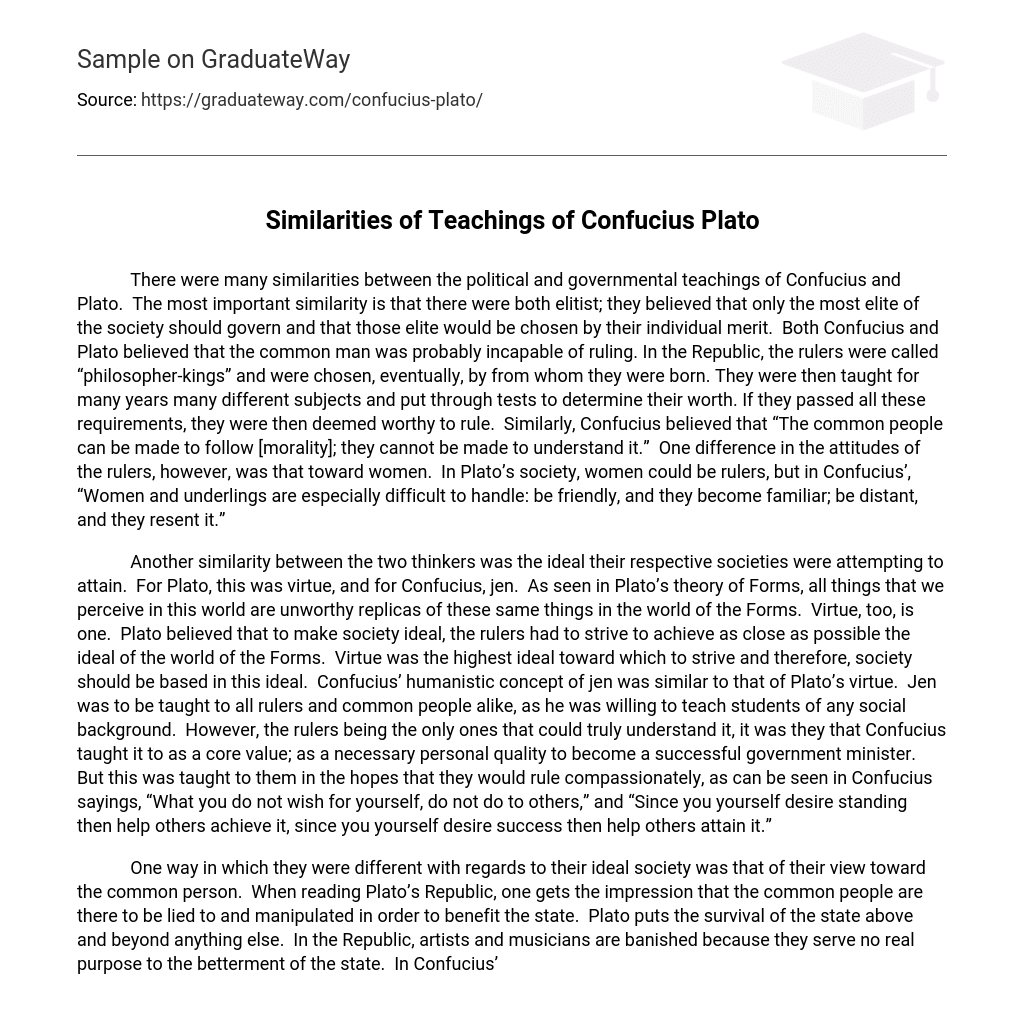There were many similarities between the political and governmental teachings of Confucius and Plato. The most important similarity is that there were both elitist; they believed that only the most elite of the society should govern and that those elite would be chosen by their individual merit. Both Confucius and Plato believed that the common man was probably incapable of ruling. In the Republic, the rulers were called “philosopher-kings” and were chosen, eventually, by from whom they were born. They were then taught for many years many different subjects and put through tests to determine their worth. If they passed all these requirements, they were then deemed worthy to rule. Similarly, Confucius believed that “The common people can be made to follow [morality]; they cannot be made to understand it.” One difference in the attitudes of the rulers, however, was that toward women. In Plato’s society, women could be rulers, but in Confucius’, “Women and underlings are especially difficult to handle: be friendly, and they become familiar; be distant, and they resent it.”
Another similarity between the two thinkers was the ideal their respective societies were attempting to attain. For Plato, this was virtue, and for Confucius, jen. As seen in Plato’s theory of Forms, all things that we perceive in this world are unworthy replicas of these same things in the world of the Forms. Virtue, too, is one. Plato believed that to make society ideal, the rulers had to strive to achieve as close as possible the ideal of the world of the Forms. Virtue was the highest ideal toward which to strive and therefore, society should be based in this ideal. Confucius’ humanistic concept of jen was similar to that of Plato’s virtue. Jen was to be taught to all rulers and common people alike, as he was willing to teach students of any social background. However, the rulers being the only ones that could truly understand it, it was they that Confucius taught it to as a core value; as a necessary personal quality to become a successful government minister. But this was taught to them in the hopes that they would rule compassionately, as can be seen in Confucius sayings, “What you do not wish for yourself, do not do to others,” and “Since you yourself desire standing then help others achieve it, since you yourself desire success then help others attain it.”
One way in which they were different with regards to their ideal society was that of their view toward the common person. When reading Plato’s Republic, one gets the impression that the common people are there to be lied to and manipulated in order to benefit the state. Plato puts the survival of the state above and beyond anything else. In the Republic, artists and musicians are banished because they serve no real purpose to the betterment of the state. In Confucius’ ideal society though, there is a reverence and a respect for the dignity of the common person. Confucius state was not supposed to interfere much with the common people’s lives. Two ways in which this is seen is his desire to keep taxes and military conscription as low as possible. As Confucius says, “You may rob the three armies of their commander, but you cannot deprive the humblest peasant of his opinion.”
Both Plato and Confucius have influenced different societies throughout history. They seem to influence in a cyclical manner; for some years their teaching are very influential, and others they are nearly forgotten. Confucius’ teachings lead to a systematized form of Daoism, rulers who killed many Confucius scholars, and his Analects became the basis of government examinations in the Han Dynasty. Plato has influenced the Roman Catholic Church and modern Universities in their view of meritocracy. These two thinkers will continue to influence into the future.
Works Citied
Plato. (1992). Republic. 1st ed. Indianapolis, IN: Hackett.





